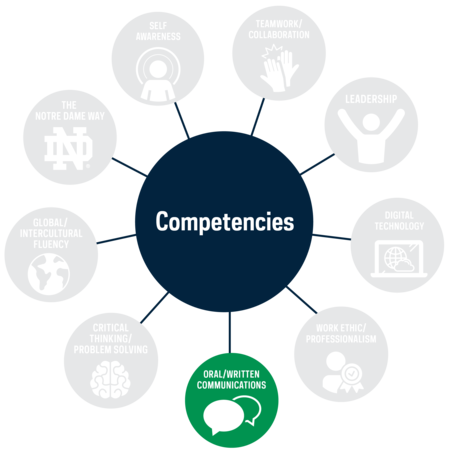Verbal/Written Communication

Verbal/Written Communication
Verbal and written communication is the ability to articulate thoughts and express ideas effectively using oral, written and non-verbal communication skills (to inform, instruct, and persuade), to multiple audiences, as well as to listen for meaning and understanding.
Assessing Your Level of Competency
Graduate School is a time to challenge yourself in new ways that will increase your comfort and presence when interacting with others to positively affect your progress with this competency. Ask yourself the following questions to dive deep into your self-assessment:
- Can you identify and use the grammatical style guide that is most commonly used in your discipline or field?
- Do you know how to write the components of a peer reviewed journal publication (e.g. abstract, conclusion, citations, etc.)?
- Do others often have to ask you to repeat yourself or clarify your comments when speaking?
- Do others ask clarifying questions in your written communication, or are you clear and concise?
- Are you able to articulate questions that arise while reading, attending lectures/panels, or engaging in conversation?
- Can you recognize when enough is enough when writing an email or communication rather than making it longer than necessary? Being brief but specific!
- Do you feel comfortable speaking in front of others?
- Do you ensure your written communications are error free before submitting?
- The flip side of communicating is listening, do you truly listen when others are speaking?
- Do you take the time to think before you speak?
Building Your Level of Competency
Build on your level of this competency through the following:
- If you are non-native speaker, seek out relevant workshops and other services to improve your language skills offered by CSLC, ISSA, Writing Center, and the Kaneb Center.
- Ask faculty for feedback and tips on your writing.
- Proofread online and written communication to avoid errors, keeping your audience in mind.
- Utilize the Office of Grants and Fellowships, which offers 1-1 consultations, workshops, and Self-Directed Tutorials.
- Look for opportunities to share your work at conferences, symposia, and departmental events, e.g. poster presentations.
- Take a class that emphasizes speaking extemporaneously.
- Build digital communications skills, including PPT or similar programs.
- Check for understanding when speaking with others by asking clarifying questions.
- Conduct informational interviews.
- Develop a strong professional online presence on LinkedIn, your own website, and/or social media.
- Create professional job search documents such as resumes and cover letters, as well as teaching, research, and diversity statements if necessary.
- Create an elevator pitch or self-introduction, and consider competing in the Shaheen Three Minute Thesis (3MT) competition.
- Modify your elevator pitch/self-intro for different audiences (e.g. employers, faculty, other students, the public).
- Attend networking events and employer information programs and talk to at least three new people at each event.
- Practice interviewing/speaking skills with Big Interview and schedule a mock interview appointment with your Graduate Career Consultant.
Communicate this Competency
Your communication skills will be on display throughout the application process--your cover letter, resume and follow-up notes as well as your interviewing skills are all ways you communicate with potential employers. That's why it's essential to develop your job search skills. Start with statements like the samples below to build upon:
- Initiated collaborative relationship with local nonprofit to develop assessment of client needs.
- Prepared and delivered presentation on lab results for Principal Investigator and graduate student researchers.
- Developed a social media campaign for the Science Policy Initiative, increasing membership by 150%.
- Taught conflict resolution skills to local middle and high school students using Take Ten curriculum.
- Provided excellent customer service, assisting customers with locating items and recommending materials for projects.
- Presented my research at a regional, national, or international conference either as a poster or talk.
- Gave a guest lecture at my alma mater about my research.
- Communicated with cross-disciplinary collaborators about “project X” leading to “Y result.”
Career Ready Competency Tracking Tool
Download the Career Ready Competency Tracking Tool one time from the main Career Competencies webpage, and utilize one document to track the development of all your competencies.